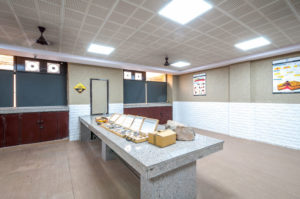Geotechnical Engineering is the study of applications of principles of soil and rock mechanics to real-world problems and is a relatively young field of Civil Engineering. Prof. Karl Terzaghi, who is referred to as the “Father of Soil Mechanics”, published the first book on soil mechanics in 1925. Geotechnical engineers deal with the behavior of soils under static and dynamic loads, water seepage and contaminant flow in soils, and analysis and design of structures made with soils, foundations for all kind of structures drawing their support from soils, temporary and permanent retaining structures, natural and engineered slopes, several components of landfills, and pavements. Geotechnical engineers work closely with structural and environmental engineers. Understanding and applying the concepts of soil mechanics requires the sound knowledge of physics, statics, dynamics, mathematics, and mechanics of materials.
Geotechnology Lab. is run in conjunction with the theory course Soil Mechanics and Geotechnology. The occurrence and distribution of soils in nature varies from location to location. The type of soil depends on the rock type, its mineral constituents and the climatic regime of the area. Soils are used as construction materials or the civil engineering structures are found in or on the surface of the earth. Geotechnical properties of soils influence the stability of civil engineering structures. Most of the geotechnical properties of soils influence each other. In this lab. different geotechnical properties of soils such as specific gravity, density index, consistency limits, particle size analysis, compaction, consolidation, permeability and shear strength and their interactions and applications for the purpose of civil engineering structures are studied.
Course Objectives:
- Provide civil engineering students with the basic knowledge to carry out field investigations including a collection of soil samples for testing and observation of soil behavior to identify soils in geotechnical engineering practice.
- Educate civil engineering students in performing and interpreting laboratory tests for evaluating subgrade performance and for pavement design.
- To develop an appreciation soil as a vital construction material, and of soil mechanics in the engineering of civil infrastructure;
- To develop an understanding of the relationships between physical characteristics and mechanical properties of soils.
- To understand and experience experimental measurement of the physical and mechanical soil properties commonly used in engineering practice.
- To provide knowledge of laboratory tests needed to determine soil design parameters.
- To develop the ability in the students to design and conduct experiments as well as analyze and interpret data.
- To develop good technical reporting and data presentation skills.
Course Outcomes: Students who successfully complete this course will be able to:
- Apply fundament concepts learned previously (or concurrently) in Mathematics, Statics, Mechanics, and Fluid Mechanics to the solution of fundamental Civil Engineering soil mechanics analysis/design problems.
- Conduct and estimate various soil parameters such as specific gravity, field density, various consistency limits
- Identify and classify soil based on the gradation of its particle size.
- Perform laboratory compaction and in-place density tests for fill quality control.
- Perform and interpret direct shear tests and estimate shear strength parameters.
- Conduct and estimate the shear strength of soils in unconfined compression.
- Perform and analyze constant head falling head permeability tests.
- Perform and determine bearing capacity of soil using Plate load test.
- Conduct one-dimensional compression tests and estimate settlement parameters.
- Develop and implement laboratory procedures to test geotechnical engineering concepts.
- Understand both the applications and limits of engineering methods commonly used to solve soil mechanics problems in Civil Engineering. Also to be aware of more advanced techniques that are available for unusual problems.
- Recognize the importance of good written communication skills, and know how to write professional, clear, concise technical reports and letters to clients and colleagues.






